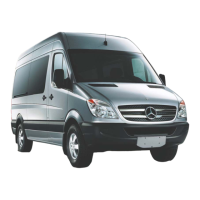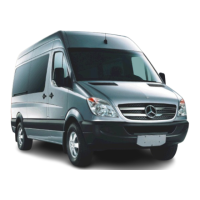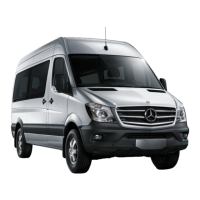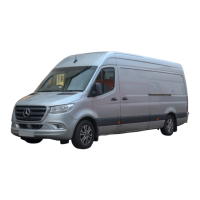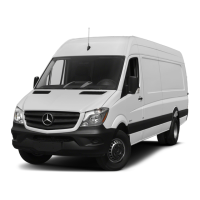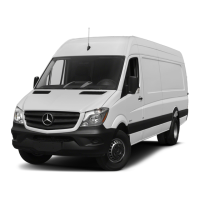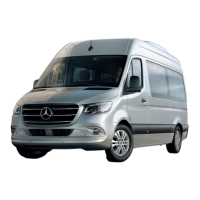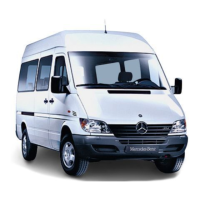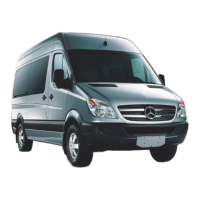Do notuncouple atrailer with an overrun brakein
astate of overrun. Otherwise, therebound of the
overrunbrake can damageyour vehicle.
#
Shiftthe selector levertoposition j.
#
Applythe vehicle's parking brake.
#
Close all thedoors.
#
Applythe trailer's parking brake.
#
Securethe trailer againstrolling away witha
wheel chockorsimilar object.
#
Remove thetrailer cables and safetychains.
#
Uncouple thetrailer.
Information about towing atrailer
Operatingatrailer is subject to manystatutory
regulations suchasspeed restrictions.
Manystatesalso requireanauxiliaryseparate
functional brakingsystem when towing aweight
that exceeds acertain limit.For your safety, it is
recommended to use aseparatefunctional brak‐
ing system on anytowedvehicle.
Makesurethat your trailer combinationmeets
local regulations. This notonlyapplies to your
placeofresidence, but also to your destination.
Informationonthis can be obtained from the
police and local authorities.
Complywiththe following when driving witha
trailer:
R
Practice cornering, stopping and backing up
in atraffic-free location. In this way, youwill
gain driving experience and become accus‐
tomed to thenew handling characteristics.
R
Beforedriving, checkthe following:
-
that thetrailer towhitch and ball coupling
aresecure
-
that thesafetyswitch forbrakedtrailersis
functioning correctly
-
that thesafetychains aresecureand
undamaged
-
that theelectrical connectionsare secure
-
that thelights arefunctioning correctly
-
thewheels fordamage and correct tire
pressure(/page 294)
R
Adjustthe outside mirrors so that youhave a
clearviewofthe rear sectionofthe trailer.
R
If thetrailer is equipped withanindividual
braking system, checkbeforeeachjourney
whether thebrakesare functioning correctly.
R
If thetrailer has electronicallycontrolled
brakes, pull away carefully with thevehicle/
trailer combination.Brake manually using the
brakecontroller and checkwhether the
brakes arefunctioning correctly.
R
Secure theload on thetrailer in line withthe
requirements and rules forload-securing
methods.
R
When driving withatrailer,checkatregular
intervals that theload is secureand that the
lightsand brakes arefunctioning correctly.
R
Bearinmind that thehandling characteristics
aremoreunstable when towing atrailer than
when drivingwithout atrailer.Avoid sudden
steering movements.
R
The vehicle/trailer combination is heavier,
accelerates moreslowly, has areduced
climbing ability and an increased braking dis‐
tance. It is moresusceptible to side winds
and requires careful steering.
R
If possible, do notbrake suddenly, but rather
moderatelyatfirst so that thetrailer can acti‐
vate its brakes. Then increase thepressureon
thebrake pedal.
R
If theautomatic transmission shifts between
gearsonuphill or downhill gradients, restrict
theshiftrange. Select shiftrange4,3,2or1.
Alowergear and reduced speed decrease the
risk of engine damage.
R
When driving on adownhill gradient, shifttoa
lowergear to use theengine'sbraking effect.
Avoid constant braking, as this could cause
thevehicle brakes and possibly also the
trailerbrakestooverheat.
R
If thecoolant temperatureincreases signifi‐
cantly when theair-conditioningsystemis
switched on, switchthe air-conditioning sys‐
temoff.
Coolant heat can also be dissipated by
switching theairflow and thetemperatureof
theheater or air conditioning to themaximum
level. Open thewindows if necessary.
R
When overtaking, payparticular attention to
theincreased overtakingdistance of your
vehicle/trailer combination.
Due to thelengthofyour vehicle/trailer com‐
bination youwill requirealonger stretchof
road beforeswitching backtothe original
lane.
Driving and parking
163
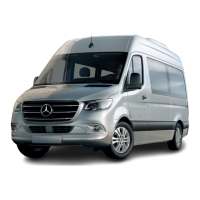
